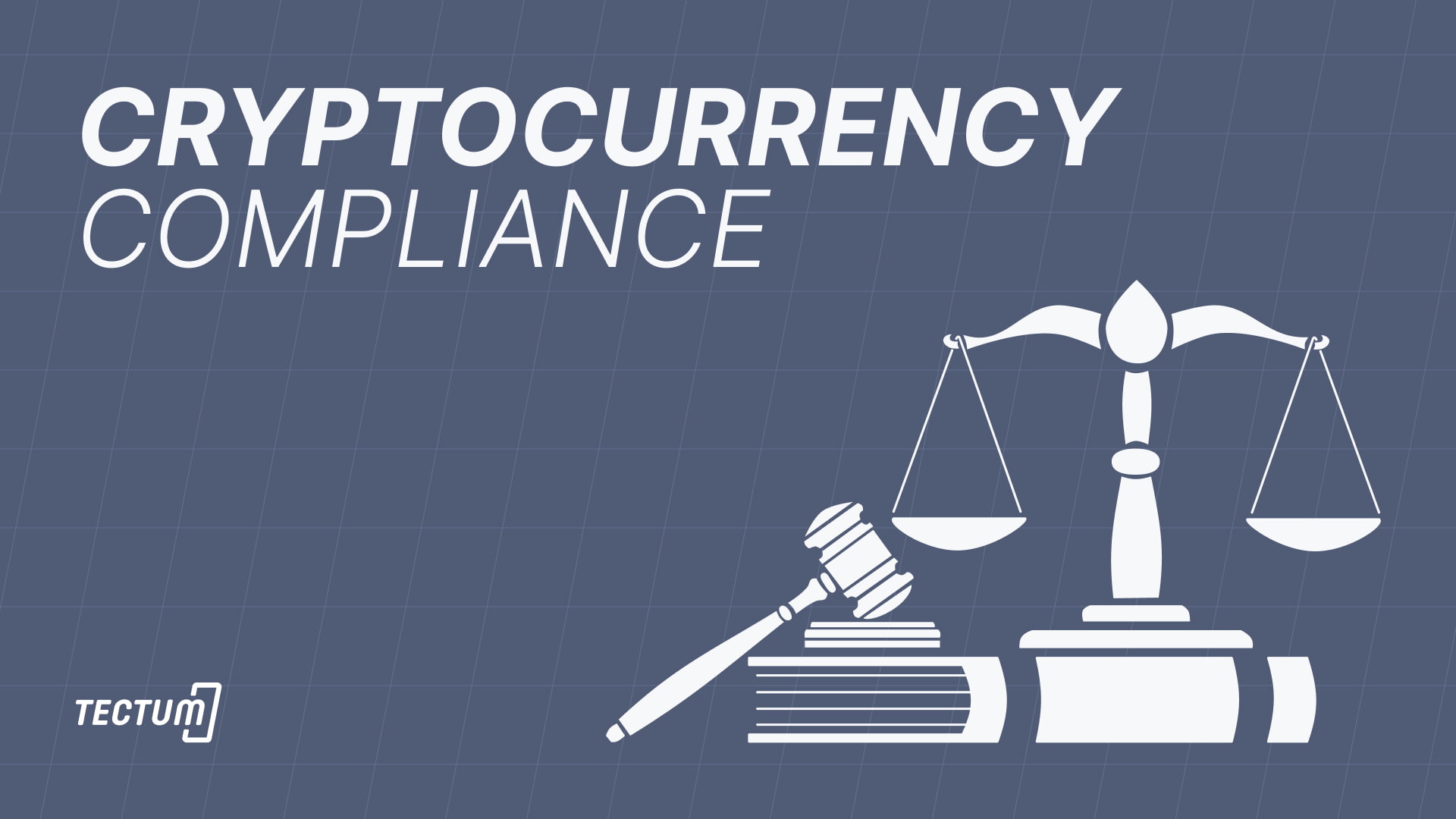Investors and corporations are finding a wealth of new prospects in the exponentially growing cryptocurrency landscape. However, fresh complexities, primarily in cryptocurrency compliance, come with these new possibilities.

Governments and regulatory authorities have begun noticing the escalating popularity of cryptocurrencies. As a result, they are progressively looking to govern this burgeoning asset class. In this article, we’ll delve into cryptocurrency compliance, covering various essential aspects.
Cryptocurrency Compliance: An Overview
When participating in cryptocurrency-related operations, entities, and individuals must follow a series of rules, policies, and practices – even though the rules are mostly provisional and aren’t totally clear yet.
These operations range from buying, selling, and trading cryptocurrencies to delivering cryptocurrency-related services, such as exchanges, wallets, and payment processing.
‘SEC Has No Intention’ of Providing Clear Rules for Crypto: Coinbase
► https://t.co/iNvO0F02gb https://t.co/iNvO0F02gb— Decrypt (@decryptmedia) May 24, 2023
Aim and Application of Cryptocurrency Compliance
Cryptocurrency compliance aims to ensure these activities occur legally and transparently. It involves adherence to diverse regulations concerning money laundering, terrorist financing, consumer protection, and tax compliance.
Entities must incorporate measures like customer due diligence, risk evaluations, and transaction monitoring. Reporting of suspicious undertakings and adhering to regulatory prerequisites in applicable jurisdictions also form part of compliance practices.
-
Ensuring that activities occur in a lawful, transparent manner.
-
Adhering to diverse regulations
-
Incorporating key measures
-
Adherence to regulatory requirements in the relevant jurisdictions.
Facing the Dynamics of Cryptocurrency Compliance
Cryptocurrency compliance is a dynamic sector that continually grapples with regulatory modifications and challenges. Participants in cryptocurrency activities must stay updated with the most recent regulatory alterations and compliance obligations.
This vigilance helps them steer clear of legal and reputational hazards. Furthermore, it preserves the integrity of the cryptocurrency ecosystem.
Compliance Necessities for Cryptocurrency Companies and Wallet Providers
Depending on jurisdiction and the wallet service type, cryptocurrency wallet providers’ compliance needs vary. Nevertheless, some general compliance requirements may apply, which include:
- Know Your Customer (KYC): Wallet providers often need to carry out KYC procedures to authenticate their users’ identities. It may involve gathering personal information like name, address, and date of birth, and verifying them with government-issued identification.
- Anti-Money Laundering (AML): To deter money laundering or terrorist financing on their platforms, wallet providers must put AML measures in place. It can involve transaction monitoring, risk assessments, and reporting suspicious activities to regulatory bodies.
- Security Measures: Wallet providers must put in place robust security protocols to guard users’ digital assets against theft or hacking. It can include multi-factor authentication, encryption, and cold storage of private keys.
- Data Privacy: Wallet providers must respect data privacy laws while handling user data. This implies obtaining user consent for data collection and securing and protecting user data.
- Compliance with Local Laws: Wallet providers must respect local laws and regulations in their operational jurisdictions. It can involve obtaining licenses or registrations and abiding by tax regulations.
- Transparency: Wallet providers must clearly express their fees, terms of service, and the risks of using their platform. They should also provide lucid and easily accessible information about their compliance measures to users.
The Importance of Cryptocurrency Compliance Certification
As the cryptocurrency industry keeps growing, standardized compliance practices are becoming increasingly important. Several organizations have created certification programs to help professionals comprehend cryptocurrency compliance’s complexities. These programs typically cover anti-money laundering (AML) regulations, sanctions compliance, and anti-terrorism financing (ATF) compliance.
The Blockchain Training Alliance and Blockchain Intelligence Group, among others, offer the Certified Cryptocurrency Investigator (CCI) certification as one such program. The program aims to help professionals grasp a deep understanding of the cryptocurrency industry, covering both the technical aspects of blockchain technology and the surrounding legal and regulatory issues.
Certified Cryptocurrency Auditor: An Overview
A Certified Cryptocurrency Auditor (CCA) is a professional with a certification that signifies expertise in auditing operations and processes in the cryptocurrency field. This auditor has acquired a substantial understanding of cryptocurrencies’ technical and regulatory aspects.
A CCA’s primary role involves conducting audits on businesses’ or organizations’ cryptocurrency-related transactions and operations. Mastery of blockchain technology, cryptocurrency mechanisms, regulatory compliance, and the risks associated with cryptocurrencies is crucial for them. Their audits contribute to a cryptocurrency business’s operations’ transparency, accuracy, and safety.
The Connection to Cryptocurrency Compliance
Several reasons underline the importance of a Certified Cryptocurrency Auditor in cryptocurrency compliance:
- Ensuring Regulatory Compliance: CCAs have the responsibility of ensuring businesses dealing with cryptocurrencies comply with relevant laws and regulations, like KYC, AML, and CTF regulations. Periodic audits ensure compliance continuity.
- Overseeing Transaction Auditing: They play a pivotal role in transaction auditing. Detecting irregularities, fraudulent activities, or inconsistencies in cryptocurrency transactions contributes to maintaining the integrity of the blockchain.
- Conducting Risk Assessment: A key role of CCAs involves assessing potential risks associated with an organization’s cryptocurrency operations. These assessments help organizations identify and mitigate possible risks, ensuring secure operations.
- Checking Security Measures: They ensure the security measures of the businesses, such as wallet security, transaction security, and data protection, meet best practices and compliance requirements.
- Reviewing Policies and Procedures: CCAs analyze the organization’s cryptocurrency policies and procedures to ensure they align with regulatory standards and best practices. They also suggest improvements to ensure better compliance.
Cryptocurrency Lawyers (Understanding Their Roles)
A cryptocurrency lawyer is a legal professional whose specialization lies in the field of cryptocurrencies and blockchain technology. These lawyers understand in depth the laws and regulations applicable to cryptocurrencies, Initial Coin Offerings (ICOs), blockchain technologies, and related financial transactions. Their knowledge often extends to securities law, financial regulation, contract law, and business law.
Discovering Cryptocurrency Lawyers or Cryptocurrency Law Firms
To find a cryptocurrency lawyer, consider the following methods:
- Explore Law Firms: Numerous law firms now house departments or specialists focusing on cryptocurrencies and blockchain technology. Conduct an online search or look through local directories to find these firms.
- Utilize Online Platforms: Multiple online platforms specialize in connecting individuals with legal professionals in various fields, including cryptocurrencies. Websites such as UpCounsel, LegalMatch, or Avvo can assist you in your search.
- Ask for Referrals: Trusted friends, family, or business associates with experience with cryptocurrency lawyers can give word-of-mouth referrals. This method often proves reliable.
- Engage with Legal Associations: Many professional legal associations, especially those focusing on technology or financial law, have directories of lawyers in various specializations, including cryptocurrency.
Cryptocurrency Lawyers & Cryptocurrency Law Firms in the Sphere of Cryptocurrency Compliance
Cryptocurrency lawyers play an indispensable role in cryptocurrency compliance:
- Guiding through Regulations: They offer guidance on adhering to financial regulations, tax laws, anti-money laundering (AML) laws, and other relevant laws in different jurisdictions.
- Providing Legal Representation: They act as legal representatives for clients in matters related to cryptocurrencies, such as litigation, regulatory investigations, and contract disputes.
- Advising on Risk Management: They offer advice on risk management strategies related to cryptocurrency use, helping businesses understand and mitigate potential legal risks.
- Assisting in Policy Development: They aid in developing policies and procedures in compliance with legal and regulatory requirements. This ensures businesses stay compliant while engaging in cryptocurrency transactions.
- Educating on Legal Landscape: They keep clients informed about the evolving legal landscape of cryptocurrencies, helping them stay updated on regulatory changes.
Estate Planning for Cryptocurrency
Estate planning for cryptocurrency involves strategizing for the transfer of digital assets like Bitcoin, Ethereum, TET, and SoftNote among others, in the event of the owner’s death or incapacitation. Much like traditional assets, these digital valuables can form a significant part of an individual’s estate, requiring careful consideration in estate planning.
The planning generally includes instructions for accessing and locating these assets, nominating beneficiaries, and considering the transfer’s tax implications.
Estate Planning for Cryptocurrency Best Practices for Cryptocurrency Compliance
Cryptocurrency compliance greatly influences estate planning for cryptocurrencies, and they connect in the following ways:
- Adherence to Regulatory Compliance: Cryptocurrency laws differ across jurisdictions, with some nations having specific inheritance laws related to cryptocurrencies. An estate plan that complies with these laws ensures a smooth and legal transition of digital assets.
- Maintaining Tax Compliance: Cryptocurrencies come with various tax implications. The executor of the estate must abide by tax laws related to inheritance, capital gains, and potentially income tax. Non-compliance with these laws can lead to penalties and fines.
- Compliance with Anti-Money Laundering (AML) and Know Your Customer (KYC) Regulations: Digital asset exchanges necessitate compliance with AML and KYC rules for transferring assets to beneficiaries. An estate plan should consider these requirements to avoid complications in asset transfer.
- Ensuring Security of Digital Assets: Adhering to best practices in securing digital assets is vital. This includes safeguarding wallet access, using hardware wallets for storage, and routinely updating security protocols.
Non-Profit Cryptocurrency: An Overview
Non-profit cryptocurrency is accepting cryptocurrencies like Bitcoin, TET, SoftNote, and Ethereum for charitable donations to non-profit organizations. This new method expands the donors’ contribution avenues and broadens the non-profit organizations’ fundraising reach, involving the increasing community of cryptocurrency users.
As a cost-effective and efficient global transaction method, digital assets heighten the prospects for international donations.
Best Practices Ensuring Cryptocurrency Compliance for Non-Profits
As cryptocurrency offers novel avenues for non-profit fundraising, it brings with it the necessity for compliance guidelines adherence. Here are the best practices for non-profits:
- Comprehend and Follow Tax Laws: Non-profits must understand the tax implications of accepting cryptocurrencies within their jurisdiction. They should know how to report charitable contributions of cryptocurrency and the treatment of such contributions.
- Employ Strong Security Measures: Ensuring donor information’s safety and preventing unauthorized access necessitates robust security measures in cryptocurrency transactions. Secure wallets, multi-factor authentication, and routine security system updates are a must for non-profits.
- Adherence to KYC/AML Regulations: Abiding by Know Your Customer (KYC) and Anti-Money Laundering (AML) regulations is critical when accepting cryptocurrency donations. This practice involves scrutinizing transactions for suspicious activities and verifying donors’ identities.
- Promote Transparency: Non-profits need to maintain trust with donors by providing clear information about their cryptocurrency donation process, including the usage of donations. Blockchain technology can aid in this transparency by providing a traceable record of all transactions.
- Educate the Team: A team that can handle cryptocurrency transactions securely and efficiently is crucial. Non-profits can utilize training programs and educational resources to help their staff navigate this new donation form.
Cryptocurrency Business Accounts
A cryptocurrency business account forms a digital platform, enabling businesses to conduct transactions, store, and manage their cryptocurrency wealth. Such accounts proffer tools tailored to business functions, including security upgrades, multi-user access, and compatibility with accounting software in some cases. They simplify the process of transacting in cryptocurrency, be it accepting payments, paying suppliers, or managing corporate investments.
Essential Practices to Ensure Cryptocurrency Compliance
As beneficial as a cryptocurrency business account may be, it demands adherence to stringent compliance guidelines for legal and transparent operations. Here’s a quick rundown of the best practices for cryptocurrency compliance:
- Employ KYC and AML Protocols: Businesses should verify their customers’ identities and monitor transaction activities to deter illegal endeavors, as part of KYC and AML regulations.
- Opt for Robust Security: Businesses should ensure strong security protocols, which may include multi-factor authentication, secure asset storage solutions, and routine security system updates.
- Follow Tax Laws: Understanding and abiding by the tax implications of cryptocurrency transactions, which vary per jurisdiction, is paramount. This involves meticulous record-keeping for tax reporting.
- Conduct Regular Audits and Compliance Checks: Regular audits can detect and address compliance issues early. Compliance checks should form an integral part of a company’s routine operations.
- Invest in Training and Education: Businesses should ensure employees comprehend the proper management of a cryptocurrency business account, including its security and compliance aspects. Routine training and education can minimize risks associated with human error.
Cryptocurrency Smart Contracts and Artificial Intelligence
Cryptocurrency smart contracts are self-executing contracts with the terms of the agreement directly written into lines of code. They automatically perform transactions and other actions when their conditions are met, eliminating the need for a middleman. Notably, Ethereum is one platform that widely employs smart contracts.
Artificial Intelligence (AI) in the context of cryptocurrency refers to the use of machine learning and other AI technologies to predict market trends, automate trading, detect fraudulent transactions, and more. AI can bring efficiency and improved decision-making to various cryptocurrency management and trading aspects.
Best Practices for Cryptocurrency Compliance with Smart Contracts and AI
To fit into cryptocurrency compliance, the following best practices for smart contracts and AI can be considered:
- Conduct Regular Audits: Regular audits of smart contracts can help ensure they are functioning as intended and are free of vulnerabilities that could be exploited.
- Stay Updated with Regulations: As the regulatory landscape for cryptocurrencies and blockchain technology is rapidly evolving, staying updated with the latest laws and regulations is crucial.
- Incorporate AI Responsibly: When using AI for tasks like market predictions or automated trading, it’s essential to use these tools responsibly and understand their limitations. Misuse can lead to significant financial losses.
- Use AI for AML Compliance: AI can help in meeting Anti-Money Laundering (AML) compliance by detecting unusual or suspicious activity.
- Ensure Privacy and Security: Whether it’s the data used by AI or the information stored in a smart contract, privacy and security must be paramount. Encryption, access controls, and other security measures should be in place.
Cryptocurrency Software Development
Cryptocurrency software development involves creating digital solutions that enable the use and management of cryptocurrencies.
These solutions range from cryptocurrency wallets and exchanges to blockchain platforms and smart contract systems. They help individuals and businesses interact with cryptocurrencies, engage in transactions, track cryptocurrency portfolios, and much more.
Best Practices for Compliance in Cryptocurrency Software Development
To ensure compliance in cryptocurrency app development, the following best practices can be considered:
- Security First: Security should always be the priority in cryptocurrency software development. This includes measures like encryption, secure coding practices, frequent security audits, and using secure development frameworks.
- Adhere to Regulations: Different jurisdictions have different regulations regarding cryptocurrencies and related services. Always stay informed about the relevant laws and regulations in the regions where the software will be used.
- Transparency: Be transparent about the software’s features, its risks, and how it handles user data.
- KYC and AML Integration: When developing software related to transactions or trading of cryptocurrencies, integrating KYC (Know Your Customer) and AML (Anti-Money Laundering) processes is a must to prevent the illicit use of the platform.
- Regular Updates and Maintenance: Keep the software updated with the latest security patches and upgrades. Regular maintenance helps to ensure smooth operation and the security of the software.
- Educate Users: Provide clear instructions and education to users about how to use the software safely and effectively.
Cryptocurrency Machine Learning
Cryptocurrency machine learning involves using advanced algorithms to analyze and predict cryptocurrency market trends. Machine learning systems ingest large amounts of data, learn from that data, and make predictions or decisions without explicit programming.
In the cryptocurrency world, machine learning tools can help predict market movements, detect fraudulent transactions, and provide insights for better decision-making.
Achieving Cryptocurrency Compliance with Machine Learning
Machine learning can play an important role in cryptocurrency compliance. Here are some best practices:
- Leverage Machine Learning for AML: Machine learning can help detect patterns indicative of money laundering, making it a potent tool for Anti-Money Laundering (AML) efforts.
- Stay Abreast with Regulations: Regulatory norms for cryptocurrencies are dynamic. Keep yourself updated with these to ensure your machine-learning tools comply with them.
- Safeguard Privacy: If your machine learning tools process personal data, it’s essential to ensure privacy regulations are adhered to.
- Maintain Transparency: Be open about how you’re using machine learning and its impact on users and their data.
- Audit Regularly: Perform regular audits of your machine learning systems to ensure they work as intended and aren’t producing biased or unfair results.
- Keep Data Secure: Protect data used by your machine learning tools with robust cybersecurity measures.
Cryptocurrency Payment Gateway Development
Cryptocurrency payment gateway development involves creating a digital platform that facilitates cryptocurrency transactions. Such gateways enable businesses to accept cryptocurrencies like Bitcoin, Ethereum, and others as payment for goods or services.
This opens up a new avenue of accepting payments, especially valuable for international transactions due to its decentralized nature, which eliminates currency exchange fees.
Compliance Best Practices for Cryptocurrency Payment Gateway Development
When developing a cryptocurrency payment gateway, it’s essential to consider the following compliance practices:
- Incorporate KYC/AML: Integrate Know Your Customer (KYC) and Anti-Money Laundering (AML) procedures to prevent illicit transactions.
- Regulation Compliance: Stay updated and compliant with local and international cryptocurrency regulations. Regulations may vary by country and are often updated.
- Robust Security: Ensure strong security measures like encryption, secure coding practices, and regular security audits to protect user data and funds.
- Privacy Protection: Maintain user privacy by following data protection laws and practices.
- Transparency: Be clear about transaction fees, processing times, and the risks associated with cryptocurrency transactions.
- Regular Audits: Conduct audits to assess the effectiveness of your compliance practices and identify areas for improvement.
Cryptocurrency Accounting
Cryptocurrency accounting involves the tracking, recording, and reporting of cryptocurrency transactions for individuals or businesses. It requires an understanding of the blockchain technology underpinning these currencies and the unique tax implications they carry.
This growing field requires accountants to adapt traditional accounting methods to suit the unique properties of cryptocurrencies.
Examples of Cryptocurrency Accounting Jobs
With the rise in cryptocurrencies, various job roles have emerged in the field of cryptocurrency accounting, including:
- Cryptocurrency Accountant: Handles the recording and reporting of cryptocurrency transactions.
- Cryptocurrency Tax Specialist: Specializes in dealing with the unique tax implications of cryptocurrencies.
- Cryptocurrency Auditor: Responsible for conducting audits of cryptocurrency transactions and practices.
- Cryptocurrency Compliance Officer: Ensures all accounting practices comply with relevant laws and regulations.
Cryptocurrency Compliance Best Practices for Accounting
For cryptocurrency accounting to fit into the larger picture of cryptocurrency compliance, several best practices should be followed:
- Regular Audits: Regular auditing of accounts can help detect irregularities and ensure compliance with regulations.
- Understanding Regulations: Keep up-to-date with local and international tax laws and regulations on cryptocurrencies.
- Accuracy: Meticulously record every transaction to ensure accuracy and transparency.
- Security Measures: Implement robust security protocols to protect sensitive financial information.
- Invest in Tech: Use advanced accounting software that can handle the complexity of cryptocurrency transactions.
Bank Cryptocurrency Policies
A bank’s cryptocurrency policy outlines the bank’s position and regulations regarding the handling of cryptocurrencies. These rules may involve how customers can use bank services to buy, sell, or hold cryptocurrencies.
The policies can also address how the bank itself interacts with cryptocurrencies, for example, whether it provides crypto-related services or accepts cryptocurrencies as payment or collateral.
Setting Up a Cryptocurrency Policy for Banks
The formulation of a cryptocurrency policy by a bank typically involves the following steps:
- Assessing Risk: Banks first assess the risks associated with cryptocurrencies, including market volatility, security issues, and regulatory risks.
- Regulatory Compliance: Banks should ensure their cryptocurrency policies align with existing financial regulations, both at the national and international levels.
- Consultation: Banks should consult with legal experts, financial advisors, and technology specialists to understand the nuances of the crypto market.
- Drafting and Approval: Once the bank understands the risk and regulations, it drafts a policy which is then reviewed and approved by its board of directors or a similar governing body.
Examples of Cryptocurrency Policies
An example of a bank’s cryptocurrency policy is that of Chase Bank. Chase allows its customers to buy and sell cryptocurrencies using its services. However, it requires customers to abide by all relevant laws and regulations and does not allow the purchase of cryptocurrencies using credit cards due to the high risk involved.
Best Practices to Fit Bank Cryptocurrency Policy into Cryptocurrency Compliance
The best practices to ensure a bank’s cryptocurrency policy is in compliance with cryptocurrency regulations include:
- Regular Monitoring: Banks should constantly monitor changes in cryptocurrency regulations to ensure their policies stay updated.
- User Education: Banks should educate their customers about the risks and regulations related to cryptocurrencies.
- Security Measures: Banks must have robust security measures in place to protect against cyber threats associated with cryptocurrencies.
- Transparency: Banks should clearly communicate their cryptocurrency policies to their customers to avoid misunderstandings or misuse of their services.
Related FAQs
How Do Cryptocurrency Exchanges Make Money?
Cryptocurrency exchanges primarily earn money through transaction fees. Every time a user buys or sells cryptocurrencies, the exchange charges a fee. Some exchanges also provide premium services for a fee, such as advanced trading features. Additionally, they might earn interest on the cryptocurrencies stored on their platform.
Minimum Age Requirement to Buy Cryptocurrency?
The legal age to buy cryptocurrency typically aligns with the legal age of the majority, which is often 18 years in many jurisdictions. However, some exchanges may set their own age limits, which could be higher. It’s important for young investors to check the regulations and rules of their specific jurisdiction and the requirements of the exchange platform.
Steps to Recover Scammed Cryptocurrency?
Recovering scammed cryptocurrency can be a complex process. As soon as you realize you’ve been scammed, contact your wallet provider or exchange to report the fraud. Next, report the incident to local law enforcement and provide them with all the information about the scam.
While the chances of recovering stolen cryptocurrency are slim due to the nature of blockchain transactions, authorities may be able to trace the scammer through their wallet address.
As soon as you realize you’ve been scammed, you should:
-
Contact your wallet provider or exchange to report the fraud.
-
Report the incident to local law enforcement and provide them with all the information about the scam.




